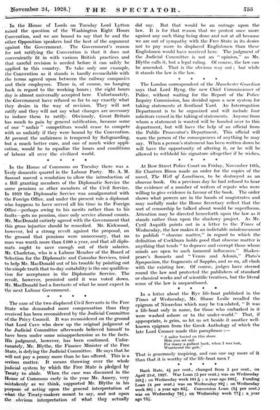The case of the two displaced Civil Servants in the
Free State who demanded more compensation than they received has been reconsidered by the Judicial Committee of:the Privy Council. It was reconsidered on the ground that- Lord Cave who drew up the original judgment of the Judicial Committee afterwards -believed himself to have been under some misapprehension as to the facts. His judgment, however, has been confirmed. Unfor- • tutiately, Mr. Blythe, the Finance Minister of the Free -State, is defying the Judicial Committee. -He says that he will not pay a penny more than he has offered. This is a serious matter. It means throwing over the whole judicial system by which the Free State is pledged by Treaty to abide. When the case was discussed in the Rouse of Commons early in the,year Mr. Amery, very mistakenly as we think, supported Mr. Blythe in his purpose of acting upon the general interpretation of -what• the Treaty-makers meant to say, and not upon the obvious interpretation of what they actually Aid say. But that would be an outrage upon the law. It is for that reason that we protest once more against any such thing being done and not at all because we are out of sympathy with the-Free State in its desire not to pay more to displaced Englishmen than these Englishmen would have received here. The judgment of the Judicial Committee is not an " opinion," as Mr. Blythe calls it, but a legal ruling. Of course, the law can be amended. That is the obvious way out ; but while it stands the law is the law.


















































 Previous page
Previous page